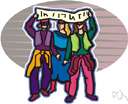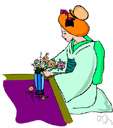agitate
Also found in: Thesaurus, Medical, Idioms, Encyclopedia.
ag·i·tate
(ăj′ĭ-tāt′)v. ag·i·tat·ed, ag·i·tat·ing, ag·i·tates
v.tr.
1. To cause to move with violence or sudden force.
2. To upset; disturb: was agitated by the alarming news.
3. To arouse interest in (a cause, for example) by use of the written or spoken word; discuss or debate.
v.intr.
To stir up public interest in a cause: agitate for a tax reduction.
ag′i·tat′ed·ly (-tā′tĭd-lē) adv.
ag′i·ta′tive adj.
Synonyms: agitate, churn, convulse, rock2, shake
These verbs mean to cause to move to and fro violently: surface water agitated by the boat's propeller; a storm churning the waves; buildings convulsed by an explosion; a hurricane rocking trees and houses; an earthquake that shook the ground.
These verbs mean to cause to move to and fro violently: surface water agitated by the boat's propeller; a storm churning the waves; buildings convulsed by an explosion; a hurricane rocking trees and houses; an earthquake that shook the ground.
American Heritage® Dictionary of the English Language, Fifth Edition. Copyright © 2016 by Houghton Mifflin Harcourt Publishing Company. Published by Houghton Mifflin Harcourt Publishing Company. All rights reserved.
agitate
(ˈædʒɪˌteɪt)vb
1. (tr) to excite, disturb, or trouble (a person, the mind, or feelings); worry
2. (tr) to cause to move vigorously; shake, stir, or disturb
3. (intr; often foll by for or against) to attempt to stir up public opinion for or against something
4. (Government, Politics & Diplomacy) (tr) to discuss or debate in order to draw attention to or gain support for (a cause, etc): to agitate a political cause.
[C16: from Latin agitātus, from agitāre to move to and fro, set into motion, from agere to act, do]
ˈagiˌtated adj
ˈagiˌtatedly adv
Collins English Dictionary – Complete and Unabridged, 12th Edition 2014 © HarperCollins Publishers 1991, 1994, 1998, 2000, 2003, 2006, 2007, 2009, 2011, 2014
ag•i•tate
(ˈædʒ ɪˌteɪt)v. -tat•ed, -tat•ing. v.t.
1. to move or force into violent, irregular action.
2. to shake or move briskly.
3. to disturb or excite emotionally; perturb.
4. to call attention to by speech or writing; discuss; debate.
v.i. 5. to arouse or attempt to arouse public interest and support, as in a political or social cause.
[1580–90; < Latin agitātus, past participle of agitāre frequentative of agere to drive, do, act]
Random House Kernerman Webster's College Dictionary, © 2010 K Dictionaries Ltd. Copyright 2005, 1997, 1991 by Random House, Inc. All rights reserved.
agitate
Past participle: agitated
Gerund: agitating
| Imperative |
|---|
| agitate |
| agitate |
Collins English Verb Tables © HarperCollins Publishers 2011
agitate
To gently shake the contents of a pan.
Dictionary of Unfamiliar Words by Diagram Group Copyright © 2008 by Diagram Visual Information Limited
ThesaurusAntonymsRelated WordsSynonymsLegend:
Switch to new thesaurus
| Verb | 1. |  agitate - try to stir up public opinion agitate - try to stir up public opinion rumpus - cause a disturbance |
| 2. |  agitate - cause to be agitated, excited, or roused; "The speaker charged up the crowd with his inflammatory remarks" agitate - cause to be agitated, excited, or roused; "The speaker charged up the crowd with his inflammatory remarks"bother - make nervous or agitated; "The mere thought of her bothered him and made his heart beat faster" pother - make upset or troubled electrify - excite suddenly and intensely; "The news electrified us" calm, still, tranquilize, tranquillise, tranquillize, calm down, quiet, quieten, lull - make calm or still; "quiet the dragons of worry and fear" | |
| 3. |  agitate - exert oneself continuously, vigorously, or obtrusively to gain an end or engage in a crusade for a certain cause or person; be an advocate for; "The liberal party pushed for reforms"; "She is crusading for women's rights"; "The Dean is pushing for his favorite candidate" agitate - exert oneself continuously, vigorously, or obtrusively to gain an end or engage in a crusade for a certain cause or person; be an advocate for; "The liberal party pushed for reforms"; "She is crusading for women's rights"; "The Dean is pushing for his favorite candidate" | |
| 4. |  agitate - move very slightly; "He shifted in his seat" agitate - move very slightly; "He shifted in his seat"move - move so as to change position, perform a nontranslational motion; "He moved his hand slightly to the right" | |
| 5. |  agitate - move or cause to move back and forth; "The chemist shook the flask vigorously"; "My hands were shaking" agitate - move or cause to move back and forth; "The chemist shook the flask vigorously"; "My hands were shaking"move - move so as to change position, perform a nontranslational motion; "He moved his hand slightly to the right" fan - agitate the air tremble - move or jerk quickly and involuntarily up and down or sideways; "His hands were trembling when he signed the document" palpitate - cause to throb or beat rapidly; "Her violent feelings palpitated the young woman's heart" convulse - shake uncontrollably; "earthquakes convulsed the countryside" sparge - agitate by introducing air or compressed gas; "sparge the water" concuss - shake violently rattle - shake and cause to make a rattling noise jactitate, thrash about, thresh, thresh about, thrash, convulse, toss, slash - move or stir about violently; "The feverish patient thrashed around in his bed" | |
| 6. |  agitate - change the arrangement or position of agitate - change the arrangement or position oftoss - agitate; "toss the salad" poke - stir by poking; "poke the embers in the fireplace" |
Based on WordNet 3.0, Farlex clipart collection. © 2003-2012 Princeton University, Farlex Inc.
agitate
verb
1. protest, campaign, push, demonstrate, drive, crusade, cry out The women had begun to agitate for better conditions.
3. upset, worry, trouble, disturb, excite, alarm, stimulate, distract, rouse, ruffle, inflame, incite, unnerve, disconcert, disquiet, fluster, perturb, faze, work someone up, give someone grief (Brit. & S. African) The thought of them inheriting all these things agitated her.
upset still, quiet, calm, soothe, calm down, appease, placate, assuage, pacify, quieten, mollify, tranquillize
upset still, quiet, calm, soothe, calm down, appease, placate, assuage, pacify, quieten, mollify, tranquillize
Collins Thesaurus of the English Language – Complete and Unabridged 2nd Edition. 2002 © HarperCollins Publishers 1995, 2002
agitate
verbThe American Heritage® Roget's Thesaurus. Copyright © 2013, 2014 by Houghton Mifflin Harcourt Publishing Company. Published by Houghton Mifflin Harcourt Publishing Company. All rights reserved.
Translations
يُثِير المَوْضُوع، يُنَاقِشيُحَرِّك، يَهُزيُقْلِق، يُثِير، يُهِيج المَشَاعِر
agitovatvzrušitzmítatzneklidnit
agitereforuroligegøre nervøsryste
agitál
hrista, ÿfakoma úr jafnvægireka áróîur fyrir
agitatoriusagituotikelti nerimąpurtytisukelti nerimą
aģitētsakratītsapurinātsatrauktuzbudināt
endişelendirmekkamuoyunun ilgisini çekmeye çalışmakkaygılandırmaksallamak
agitate
[ˈædʒɪteɪt]B. VI (Pol) to agitate for sth → hacer campaña en pro de algo
to agitate against sth → hacer campaña en contra de algo
to agitate against sth → hacer campaña en contra de algo
Collins Spanish Dictionary - Complete and Unabridged 8th Edition 2005 © William Collins Sons & Co. Ltd. 1971, 1988 © HarperCollins Publishers 1992, 1993, 1996, 1997, 2000, 2003, 2005
agitate
[ˈædʒɪteɪt] vi (politically) → faire de l'agitation politique
to agitate for sth (= campaign for) → faire campagne pour qch
to agitate against sth (= campaign against) → faire campagne contre qch
to agitate for sth (= campaign for) → faire campagne pour qch
to agitate against sth (= campaign against) → faire campagne contre qch
Collins English/French Electronic Resource. © HarperCollins Publishers 2005
agitate
vt
(fig: = excite, upset) → aufregen, aus der Fassung bringen; don’t let him agitate you → lass dich von ihm nicht aufregen
Collins German Dictionary – Complete and Unabridged 7th Edition 2005. © William Collins Sons & Co. Ltd. 1980 © HarperCollins Publishers 1991, 1997, 1999, 2004, 2005, 2007
agitate
[ˈædʒɪteɪt]1. vt (perturb) → turbare, mettere in (uno stato di) agitazione; (shake) → agitare
2. vi (Pol) to agitate (for/against) → fare un'agitazione (per/contro)
Collins Italian Dictionary 1st Edition © HarperCollins Publishers 1995
agitate
(ˈӕdʒiteit) verb1. to make (someone) excited and anxious. The news agitated her.
2. to try to arouse public feeling and action. That group is agitating for prison reform.
3. to shake. The tree was agitated by the wind.
ˈagitated adjectiveˌagiˈtation noun
ˈagitator noun
a person who tries constantly to stir up public feeling. a political agitator.
Kernerman English Multilingual Dictionary © 2006-2013 K Dictionaries Ltd.
agitate
vt. [to shake] agitar, sacudir; [to upset] inquietar, perturbar.
English-Spanish Medical Dictionary © Farlex 2012